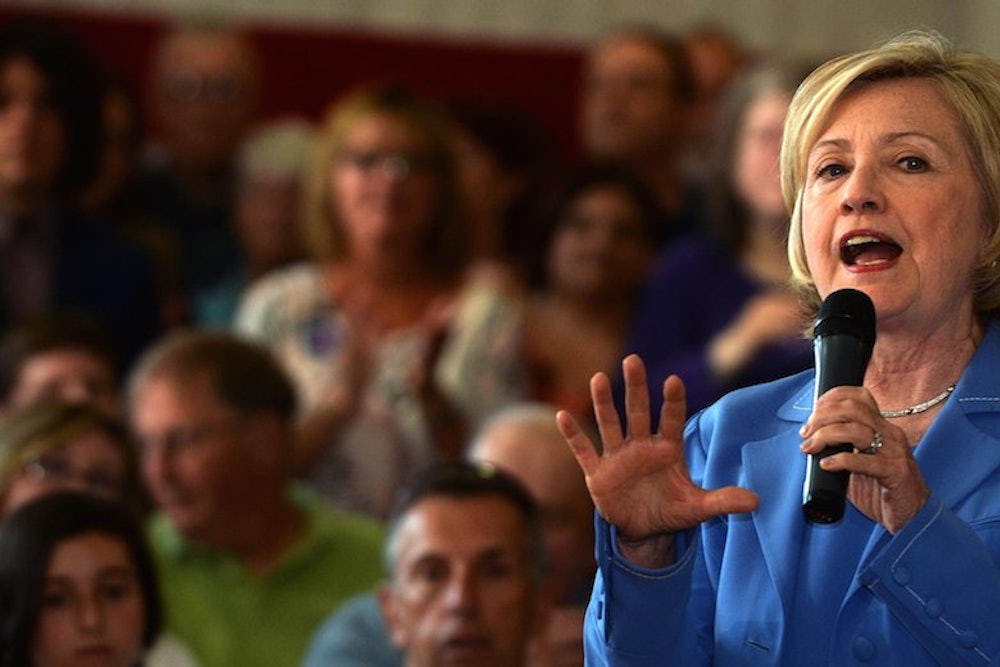On Tuesday afternoon, with the nation’s attention turned to Pope Francis making landfall in Washington, D.C., Hillary Clinton gave an Iowa town hall the answer environmentalists have long waited to hear from her on the Keystone XL pipeline. “I oppose it,” she said.
For years, the former secretary of state has insisted she could not come forward with her personal opinion on the project, using an assortment of excuses to explain that she would not comment while the State Department’s review of the project—which has stretched on endlessly, and conveniently for Clinton, since 2009—was still in progress.
That's recently changed, as the pressure for her to come forward has only grown with Senator Bernie Sanders’ rise in the polls. Last week, she warned, "I'm putting the White House on notice” on Keystone; on Tuesday, she handed Keystone activists a clear win, yet still made clear that she sees the project as one giant nuisance. "I think it is imperative that we look at the Keystone Pipeline as what I believe it is, a distraction from important work we have to do on climate change,” Clinton said. “And unfortunately from my perspective, one that interferes with our ability to move forward with all other issues."
Ignore Clinton’s grudging comments. This is a huge political victory for environmentalists. It reflects how significantly the politics around Keystone have shifted in a few years—after all, Clinton herself said she was "inclined" to approve it in 2010. Now, the expectation is Obama too will reject it. It also means the leading Democratic candidate has adopted not one, but two of green activists' key issues. Last month, Clinton said she opposes drilling in the U.S. Arctic, in a significant break from the Obama administration. "It's not worth the risk of drilling," she tweeted.
Her reasons for championing the policies that are near and dear to environmentalists probably have more to do with fending off Sanders’ unexpected success early in the campaign cycle. Sanders has long opposed Keystone, and as the White House decision has lingered, Clinton was increasingly painted into a corner. She could dodge endless questions about her position on Keystone, or she could finally silence critics who say Sanders is a better climate ally than Clinton.
But now, in a dramatic shift in perception, Clinton herself has become an ally applying pressure to the administration. Today grassroots groups praised Clinton for shaking her sometimes-aloof reputation on climate change. “Hillary is now standing with us to ask President Obama to reject the pipeline once and for all," said one anti-Keystone activist, Bold Nebraska Director Jane Kleeb, adding, "We are proud Sec. Clinton stood up for clean water today."
The question now: How much further will she go? Was the Keystone announcement politics or principle? The early primary season offers progressive activists the best chance they'll have to push Clinton to stake out aggressive climate policies, and they know it. What they hope to see next is a bold stand against federal policies that promote fossil fuel development. “I think logically the train of thought would lead anyone to say, we have to leave carbon in the ground,” Bill McKibben, a climate activist and journalist who's led the Keystone opposition, told me in an email after Clinton finally spoke out.
If Clinton continues to break with Obama on the areas where he remains weakest on the environment, she could outpace his accomplishments in office if elected president. The key is whether she continues to focus on policies that discourage the production of fossil fuels, like mining and drilling on public lands. The federal government leases 67 million acres to the fossil fuel industry, and Obama has approved leases for a quarter of them. “And the president of the U.S. actually has control over a lot of ground, without even having to ask anyone in Congress.” Clinton has clearly decided to go after the climate vote, but she will have to do more to fully earn it.
